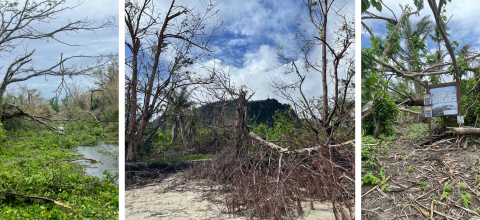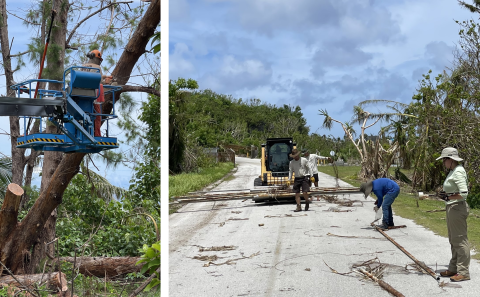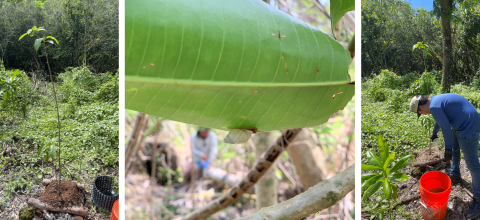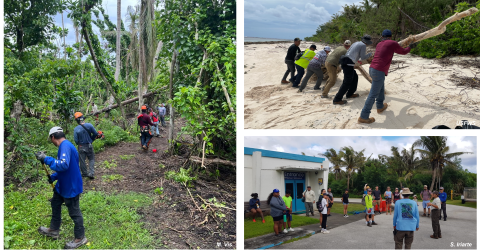Natural disasters are part of life, especially if you live on the Mariana Islands. And on May 24, 2023, Typhoon Mawar hit Guam, the southernmost Marianas Island. The entire island was impacted by the typhoon with the most severe conditions in northern Guam. Ritidian experienced the eyewall of Typhoon Mawar as it passed - leaving massive damage in its wake. After the typhoon, US Fish & Wildlife Service (the Service) encountered blocked roads and trails, numerous twisted, fallen trees, and major coastal erosion. With 385 terrestrial acres (plus 832 acres of submerged areas offshore) to manage, the Service staff are busy as can be with recovery efforts and maintaining Service mission duties, such as sea turtle nest monitoring and feral pig depredation.
Assistance from agency partner and volunteers are working together with Service staff on Ritidian’s gradual road to recovery. Whole trees, heavy branches, and natural debris along the trails and on the beach are carefully cleared to make it safe for the public’s return. Part of Ritidian’s restoration begins with the Service staff assessing areas for endangered species before any work takes place. In this case, many Guam tree snails (Partula radiolata) were displaced from the typhoon, but safely relocated (about 1,000!) before any areas were cleared of large branches and debris.
Part of the Service mission is to protect and restore habitat for our native plant and wildlife species listed under the Endangered Species Act. After the typhoon, our plants needed time to re-establish and regrow to provide habitat and food for our wildlife. We understand Ritidian is special to our local community and appreciate their patience. Know that this time is vital for the natural recovery of our wildlife and plant communities at Ritidian. After all, Ritidian’s natural and cultural heritage is what makes this Refuge so special to all its visitors.
We are grateful for service volunteers that have come out post-typhoon to help! Volunteers picked up marine debris as well as assist the Service maintenance and biological monitoring staff. Volunteers and our summer interns assisted with trail restoration, helped identify Guam tree snails for relocation, helped set up raised beds for Tabernaemontana rotensis (a threatened limestone tree species), and more. A special thank you for Hensel-Phelps volunteers and our beach clean-up volunteers that make a difference! Although Ritidian remains closed to the public, community members can still volunteer to help or go on an interpretive tour. Check out our upcoming volunteer and tour events here. We look forward to welcoming back our visitors when we re-open to the public.




![student holds a fishing pole facing a lily-filled pond; back of T-shirt says “Conservation Ranger Camp [year obscured] Arthur R. Marshall Loxahatchee National Wildlife Refuge”](/sites/default/files/styles/summary_photo/public/images/2024-09/conservation-ranger-camp-arthur-r-marshall-loxahatchee-national-wildlife-refuge-eden-taylor-national-wildlife-refuge-association-1.jpg?h=3ec75680&itok=48c6J0Ge)

